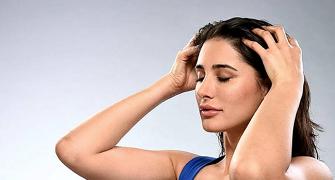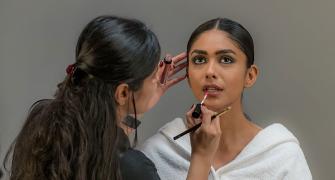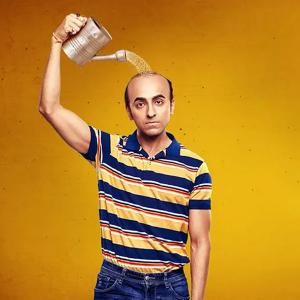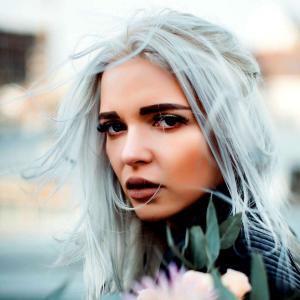Tackle your hair and skin problems with expert help from Dr Dinesh Jain.

Dear Reader, worried about your skin?
Or your hair?
Is acne the bane of your existence?
Or dandruff causing you embarrassment?
Do send in your queries about your skin and hair problems to Dr Dinesh Jain at getahead@rediff.co.in (SUBJECT: Ask Dr Jain).
Dear Dr Jain,
I have very dry hands and feet, which make them look old and ugly.
I use coconut oil on them at night, but it does not help.
The skin on my soles is also very thick.
I don’t use chappals at home.
Can you please suggest a remedy?
Malini Sharma
Yes, I can understand that -- even after having a healthy skin -- dryness can ruin its texture, look and feel.
However, dry skin isn't usually a serious problem.
In most cases, an underlying disease is not the reason.
It is caused by factors like hot or cold weather, less moisture in the air and the soaking of feet regularly in hot water.
To improve your skin, you can use moisturisers and avoid harsh, drying soaps.
Please follow these steps to tackle a dry skin problem:
1. Apply moisturiser immediately after bathing or washing your face or hands.
2. Use an ointment or cream instead of a lotion.
3. Use very gentle skin care products.
4. Use gloves in winter and, if you have excessively dry skin, even indoors when the air conditioner is used.
5. If you are handwashing clothes using detergent, if you are washing vessels or are coming in contact with harsh chemicals in any way, use gloves. These gloves, which can be washed and reused, are available online and with chemists.
6. Ensure your bath/shower water is not too hot. Excessively hot water will worsen the problem of dry skin.
7. Many times, vitamin D deficiency can cause excessive dryness.
8. Apply sunscreen to the exposed areas of your skin after half an hour after you moisturise.
Dear Dr Jain,
I am 36 years old.
The pigmentation mark from the end of my eye and on my cheeks bothers me a lot.
I am a pure vegetarian eating healthy, home-cooked food.
I tried steaming my face, potato juice, tomato juice, etc, after seeing tips on YouTube. It didn't help me.
Due to the pigmentation, I look five years older than my age.
I don't use any cream, powder, facewash, etc. I only use bathing soap.
Please help me. What should I do?
Regards,
Pramila Nayak
There are different types of pigmentation occurring in the area starting from the corner of the eye and involving your cheeks.
When there is excess pigmentation which looks darker than your normal skin, we call it hyperpigmentation.
Please don’t steam your face. Local application of potato and tomato juice will not help you either.
Hyperpigmentation is caused by an increase in melanin. Melanin is a natural pigment in your body that gives your skin its colour.
A number of factors can cause an increase in melanin, but the main reasons are:
1. Genetic
2. Exposure to the sun
3. Hormonal influences including pregnancy. This can be a major cause of pigmentation on the cheek as is known as the mask of pregnancy.
4. Age and skin injuries or inflammation
Though genetic pigmentation develops at early age and is not very common, the other three are much more common.
This kind of pigmentation on the face is a common problem women face.
There are different treatments one can consider for any hyperpigmentation:
1. First and foremost, you need to use sunscreen (SPF 50) every four hours. This will prevent increased pigmentation and also lighten the existing pigmentation.
If you have bright lights at home, you need to wear a mild sunscreen even in the evenings.
2. Lightening creams
3. Retinoids
4. Chemical peel
5. Laser peel
6. Laser therapy
Foods which can help with a pigmentation problem include:
1. Green vegetables like kale and spinach.
2. All fruits containing Vitamin C like citrus fruits, including oranges; kiwi, which has huge amounts of vitamin C and mangoes
3. Oily fish like salmon
4. Strawberries
5. Broccoli
I would suggest that you see a dermatologist and get yourself evaluated so that you can embark on the right course of treatment.
Hi Dr Jain.
My name is Raghu; I am 38 years old.
Right after I wash my hair with shampoo, I experience an itchy scalp. After two days, dandruff forms.
Though I have tried moisturising my hair with coconut oil, almond oil and castor oil, I can't get rid of this itchy scalp problem.
I use a herbal shampoo without parabens. Please help.
Regards,
Raghu
Many times, the common cause of itching is an allergy.
You will be surprised to know that age old remedies for the scalp, like coconut or castor oil, can actually irritate it and cause dry flakes and dandruff.
The common causes of an itchy scalp are:
1. Dandruff
2. Reaction to a hair care product
3. Hives
4. Head lice
5. Scabies
6. Scalp psoriasis
Since you have a dandruff problem, I would suggest you get your scalp evaluated by an expert.
The treatment for this problem includes:
1. Antifungal shampoos and lotions
2. Salicylic acid or coal tar shampoos.
3. Zinc Pyrithone lotions and shampoos
4. Topical steroids
Do, however, use these under the guidance of a skincare expert.
You can also take the following precautions:
1. To reduce allergic reactions, try to avoid using products that contain chemicals, irritants, dyes and fragrances.
2. Avoid physical contact with people with head lice to prevent spreading lice.
3. Don’t share combs, hair clips.
4. If you are visiting a salon, ensure that any implement used on your scalp is sterilised. This includes brushes, combs and clips.
5. Do not share towels, napkins, clothes, hats and caps unless they are washed.
6. Do not share helmets.
Hello Doctor.
I have had Alopecia areata for seven years and have taken lots of allopathy and ayurvedic medicine. However, I have not recovered.
I have also taken steroid injections but there has been no resolution to this problem yet.
I have lost hair in patches on my head, eyebrow, beard and moustache.
I am afraid this will turn into Alopecia universal at some point.
I would be thankful for your guidance as I see no hope that it can be cured.
Please assist, Sir.
Regards
Jayesh
Alopecia areata is caused by your immune cells attacking your hair follicles, causing hair loss; it is a form of autoimmune disorder.
The hair loss occurs in patches and can take place all over the body.
Genetic factors also play a role in Alopecia areata.
However, many times, common hair loss is tagged as Alopecia areata and vice versa.
I would suggest you get yourself evaluated by an expert in this field.
The causes of Alopecia areata include:
1. Asthma
2. Hay fever
3. Pernicious anemia
4. Vitiligo
5. Down’s syndrome
Many times, Alopecia areata co-exists with other diseases so a blood test-based evaluation is very important.
Alopecia areata can’t be cured. But it can be treated and hair can grow back.
While steroid injections are one of the common forms of treatment, I would not recommend that you take it in excess as you might develop skin atrophy.
In my opinion, newer treatments like stem cell activation have shown promising results:
Some of the forms of treatment include:
1. Corticosteroids: Given as injections, creams or lotions.
2. Immunotherapy: A chemical in the form of an irritant is applied on the scalp. This causes mild to moderate redness and rash. As a result, the immune cells get activated and the hair ultimately grows back.
3. Topical immunosuppressants: These come in the form of ointments. When applied, they can reduce the effect of immune cells, thus helping regrow hair.
4. Minoxidil: Commonly used to treat for pattern baldness.
At home, you can try the following:
1. Wear wigs, hats or scarves. They hide your hair loss and will protect your head from the sun.
2. Reduce your stress levels. Personal problems seem to trigger Alopecia areata, although this has not been proven scientifically.
Dear Dr Jain,
My 10-year-old child has lots of white hair (approx 100) and it increasing.
It started after the child turned three.
We used to give multivitamin syrup as well as amla for treatment, with no success.
Let me know which medicine we can try.
Thanks.
Amit
My initial impression is that this may be a case of genetic premature greying of hair.
Certain deficiencies in children can also occur due to worm infestations and cause this problem.
Please check for these deficiencies under the guidance of an expert.
1. Vitamin B12 deficiency
2. Iron deficiency
3. Copper deficiency
4. Vitamin D3 deficiency
5. Calcium deficiency
6. Protein deficiency
Please correct these deficiencies, if they exist, first. It might not show you immediate results but, once the deficiency is corrected, you will see a change.
The treatment for premature grey hair that is not caused by deficiency is limited.
However, you may consider the following treatments.
1. Photo bio-stimulation with lights
2. Melatonin application
3. Oral supplementation with L-cysteine and L-methionine
These treatments should only take place under expert care.
Dr Dinesh Jain is based in Mumbai and practises at Sparsh -- the Aesthetic Clinic. He is a well known cosmetologist and specialises in anti-ageing regenerative medicine, hair regrowth and stem cell-based treatment.
His qualifications include an MBBS, DV&D, MD and an MSc.
In his two decades of practice, he has treated thousands of patients including many Bollywood stars.
Please mail your skin care queries to Dr Jain at getahead@rediff.co.in (SUBJECT: Ask Dr Jain)
Do note: This column is an advisory. Please consult your doctor before beginning any treatment.

Disclaimer: All content and media herein is written and published online for informational purposes only. It is not a substitute for professional medical advice. It should not be relied on as your only source for advice.
Please always seek the guidance of your doctor or a qualified health professional with any questions you may have regarding your health or a medical condition. Do not ever disregard the advice of a medical professional, or delay in seeking it because of something you have read herein.
If you believe you may have a medical or mental health emergency, please call your doctor, go to the nearest hospital, or call emergency services or emergency helplines immediately. If you choose to rely on any information provided herein, you do so solely at your own risk.
Opinions expressed herein cannot necessarily provide advice to fit the exact specifics of the issues of the person requesting advice.









